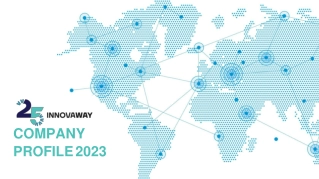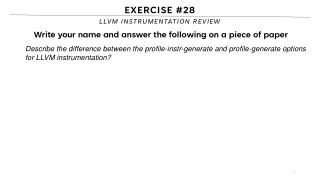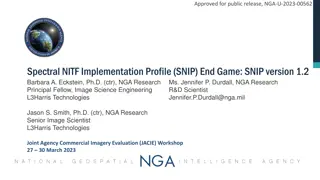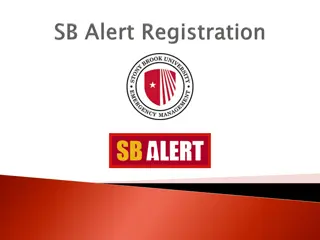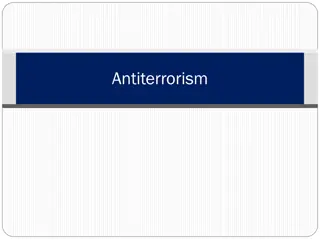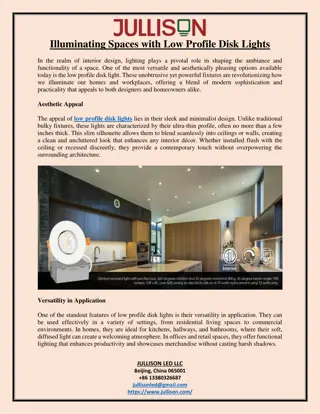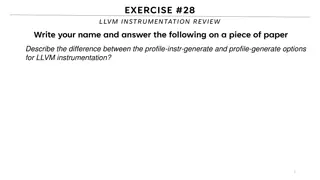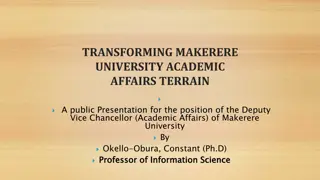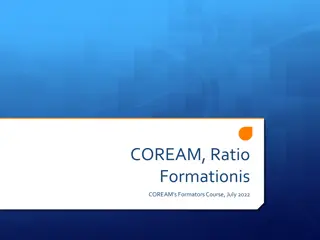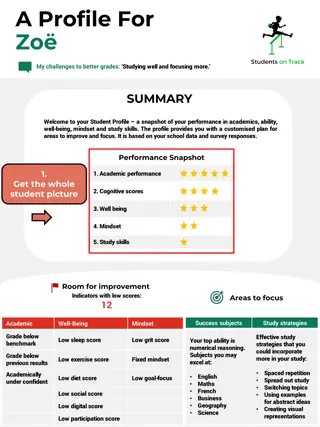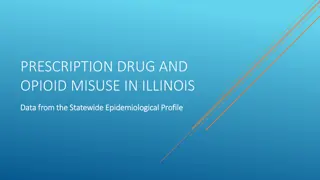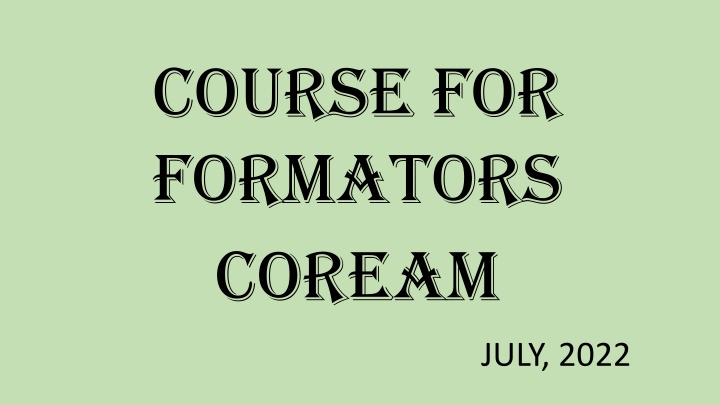
Renewing Hearts: Redemptorist Formation Insights for Coream Formators
Dive into the world of Redemptorist formation as this course for Coream formators explores the essence of formation, the profile of a Redemptorist formator, and the responsibilities associated with this role. Discover the need for adaptability, stability, and essential skills in navigating modern challenges in religious life. Delve into the process of initial and continued formation, seeking freedom, responsibility, and a deep connection to Christ and the Redemptorist charism. Embrace the call for renewed hearts and constant conversion in guiding future generations of Redemptorists.
Download Presentation

Please find below an Image/Link to download the presentation.
The content on the website is provided AS IS for your information and personal use only. It may not be sold, licensed, or shared on other websites without obtaining consent from the author. If you encounter any issues during the download, it is possible that the publisher has removed the file from their server.
You are allowed to download the files provided on this website for personal or commercial use, subject to the condition that they are used lawfully. All files are the property of their respective owners.
The content on the website is provided AS IS for your information and personal use only. It may not be sold, licensed, or shared on other websites without obtaining consent from the author.
E N D
Presentation Transcript
COURSE FOR FORMATORS COREAM JULY, 2022
1. Introduction: What Formation entails 2. Profile of the Redemptorist Formator, desired qualities and the preparation for the renewed structures of Formation 3. From the perspective of the Superiors and the awareness of their responsibility to what this assignment entails 4. Some additional observations
1. What Formation entails: http://carloscssr.files.wordpress.com/2012/06/alfonso.jpg?w=500h=348
There is no magic formula Involved is an instinct Formation involves renewed hearts and constant conversi n (restructuring) Since each generation is different there is a need for reflection, openness and constant adaptations
Despite being in an epocal change , formation recognizes the need of stability and non-negotiables .
Todays world and times requieres sensibility, knowledge, formation and skills to negotiate realities such as: INTERCULTURALITY LANGUAGES RESTRUCTURING RECONFIGURATION REDEMPTORIST IDENTITY TRENDS IN RELIGIOUS LIFE THE DEMANDS ON LEADERSHIP RENEWED AND RE-IMAGINED MISSION ETC.
Initial and continued formation: - Formation is a continual, dinamic, progressive, gradual and integrating process - Formation is a process involving freedom and responsibility - Formation seeks the roots from where events and actitudes are formed (Mt. 25) http://www.redentoristasac.com/wp-content/uploads/2012/03/DSC_05081-1024x678.jpg
In formation we seek: - configuration into Christ, our Redeemer, - interiorization of the CHARISM and the evangelical life-style lived in the Congregation - internal freedom - profound joy of vocation - capacity for self-sacrifice - a committed faith, indomable hope and disinterested love
FORMATION IS NOT EASY FORMATION IS NOT EASY In formation what is at stake is a future filled with hope Formation is an art and a gift Good formation is the fruit of nature and grace, of experience and good projects, planning and preparation
Formation is following the style of Jesus Formation is following the style of Jesus Formation requieres a personal relationship of the formator with the Redeemer, and that he be passionate in his relationship to Jesus, His kingdom and to mankind Each day and each year is more demanding, Formation is also gratifying
Formation requires a profound understanding when the other is in crisis, a good example is Jesus (His attitude,understanding, love) with the Apostle Thomas. Formation is respect of the freedom of the other. Formation knows how to wait and trust. Formation does not accelerate the momento, rather, prepares the moment. Formation is the patient builder of resilience and ideals rather than the impatient legislator of norms, critic and judger of attitudes.
Formation facilitates hope rather that controls realities Formation accompanies from within in an atmosphere of naturalness and transparency, of simplicity and confidence Formation does not inform, rather forms by attraction from the testimony of life. When necessary, with the testimony of words .
The ideal model of formation is the The ideal model of formation is the life life- -style and relationship of Jesus with his disciples: style and relationship of Jesus with his disciples: a profound interest for each one an investment in each one clossness interest confidence relationship in brotherhood and friendship forgivence, the knowing and accepting of the other
Persons who are formed in a regimen of vigilance and fear of making mistakes will reach responsible adulthood with difficulty Formation is the fruit of the collaboration between the formator and the formand.
seguir a cristo Formation is co- responsibility, the interaction with God s grace. Formation is not a monologue, that is, the formator knows it all, intuits all, judges all and determines all.
There are two extremes: Absence in the life of the formandi ( they are big boys ) A certain police type of control (for example, the obsession to control the schedules, the comings and goings, the quality of friendships, etc. --- with minute details The climate of suspicion and distrust causes harm to the formation environment: tension, internal resistence and even revolts The environment become counter-productive
2. Profile of the Redemptorist formator
FROM THE VIEWPOINT OF FROM THE VIEWPOINT OF THE FORMATORS THE FORMATORS THEMSELVES AND THEIR THEMSELVES AND THEIR SELF SELF- -AWARENESS AWARENESS
What is the Profile of a good formator: What is the Profile of a good formator: http://www.redentoristasac.com/wp-content/uploads/2012/02/img-estadisticas1.jpg Basically it is the same as the ideal Redemptorist
Formator Formator: : is is at relationships relationships: : at the the crossroads crossroads of of God FORMADOR The Church THE THEC Congregation ongregation Formand
The Congregation has some structures for the continued formation of formators, for example: - the publication of the series on Redemptorist Formation (7 volumens) - the yearly meeting of formators and courses for formators at the level of the Conferences and Units - the yearly course in English and Spanish sponsored by the Congregation s Center of Spirituality, - COREAM has the Program of Continuing Formation - etc.
The The formator formator: : clarifies and sets and sets certain clarifies objectives objectives, , offers certain limits limits and and parrameters he he seeks seeks interiorizaci n. interiorizaci n. offers criteria criteria parrameters, , For formators, this ministry is a vocation within a vocation The protagonist of formation is the formand: he learns to asume his own formation in creative fidelity in a manner that does not need excessive vigilance. The formand learns and discerns what he needs to do. Juniorado5
Four Four characteristis characteristis of of a a good good formator formator: : He is passionate in his love and dedication to Jesus and passionate about mankind He loves deeply the Church He loves his Congregation with all of its frailty and greatness (he knows how to prune the brances without touching the roots) He emphatizes with the youth of today
Three functions of the formator: Three functions of the formator: Discern with, confirm and consolidate the formand s God-given vocation Transmit y encourage the interiorization of the Charism Facilitate the maturing of the formand
In summary some qualities of a good formator: Inspiring personal life, team work, sound judgement, fidelity to the Church, enthusiastic familiarity with the Charism, effective communication, intelligence and academic preparation, pastoral experience and adequate preparation for this ministry.
3. FROM THE VIEWPOINT 3. FROM THE VIEWPOINT OF THE SUPERIORS OF THE SUPERIORS RESPONSIBLE FOR THE RESPONSIBLE FOR THE ASSIGNMENTS TO THIS ASSIGNMENTS TO THIS MINISTRY MINISTRY
Does each formation stage have good, qualified formators? Are the formators stable or does the Unit (Conference) frequently change their formators? What are the Unit s (Conference s) criteria for the selection of formators?
Is there at least a minimum projection of any required formal training that the formators will need to be effective? What is their competence, their maturity, the testimony of their religious missionary vocation? Do the formators have experience in Mission?
Do the formators have their own personal supervision and monitoring (spiritual direction)? Do the formators have familiarity and availability to the documents of the Magisterium of the Church, the Congregational documents, General Chapter and Conference decisions, etc.? Do the formators know and are they able to communicate the Congregation s history, spirituality, and Charism?
Do the formators possess the human qualities of eliciting and building trust, honest communication with the students, fairness, objectivity and boundaries consciousness? WHY IS THIS IMPORTANT: WHY IS THIS IMPORTANT: Trust is an essential human quality, but in formation programs it is a sine qua non. If those in formation do not trust their formators, or those in authority do not trust them to be doing their job, then the program will falter at various levels. Trust is not easy to build in an evaluative setting, but it is not impossible. Promoting honest communication in essential. Being strictly fair and objective and avoiding, at all cost, playing favorites, is crucial.
Does the formation team function collaboratively? WHY IS THIS IMPORTANT: WHY IS THIS IMPORTANT: A prior question could be, is there a formation team? Formation can be done one-on-one, but it is more effective in a team. Collaborative formation can also model good collaborative ministry, as well as good community. If the formators are in disarray, it can invite disruption in the program and lead to divisions. Religious life includes a call to community life; Lone Rangers and prima donnas can be disruptive at best, or divisive, marginal personalities at worst. A team approach to formation by all the formators of all the formation stages can also take the pressure off the formation director with regards to a final decision about acceptance or rejection of candidates in formation.
Do the formators interact with formators from other Congregations and Religious Institutes (of men and women)? Is there accessibility and openness towards other religious institutes? Is there an openness to the laity?
Does the formator inspire? WHY IS THIS IMPORTANT: WHY IS THIS IMPORTANT: Formators should not see their role as simple lecturers. Their role is to model the behaviour expected of the students. The seminarians and young religious need to live under the guidance of Redemptorists who are inspiriting older brothers to them. Young people look for models. They need adults about whom they feel: When I finish my formation, I want to be a person like you!
Do formators see their ministry as one that occupies the twenty-four hour of each day? WHY IS THIS IMPORTANT: WHY IS THIS IMPORTANT: Formation, like parenting, is a twenty-four-hour task. It is demanding, beautiful and influential. We help young people to grow up in all areas of life, by providing inspiring example, by creating a loving, joyful and challenging atmosphere, and by interacting with them in simple and caring ways. We become their friends and confidants for life.
A Religious can be a part-time professor; formators cannot be part-time. The formators form in the chapel, in the class-room, on the soccer, football, basketball playing fields, doing manual work, during picnics or in their sickness and in sad moments. Loving (not suspicious) familiarity breeds confidence that opens hearts and minds. Both formators and students learn, both grow.
Are the formators aware that teaching is a part of formation ministry, but formation is not limited to the classroom? WHY IS THIS IMPORTANT: WHY IS THIS IMPORTANT: If the formators are interested in the integral growth of the students, there is no limit to what the formators can teach them Bible reading, healthy tips, good manners, human relationships, leadership skills, communication, methods of meditation and prayer, good study habits, etc.
Are the formators conscious that they do not, on their own, invent the formation program? For example, the novice master does not invent the syllabus of the novitiate. The novice master follows the formation plan of the Congregation.
Does the novice master also knows what the candidate will have covered before reaching the Novitiate, and what will be covered after his novitiate?
Are the formators conscious of the impact of the respective families on the students? What is the relationship of the formator, formation house, Congregation with the families of the students? WHY IS THIS IMPORTANT: WHY IS THIS IMPORTANT: Our parents and siblings have influenced us more than our novice master or our formators. Our deepest values, our most touching experiences of tenderness, our most painful hurts, our understanding of love and God, the way we smile and laugh, the manner in which we face illness or hardship all these core traits were developed in our families. So too, some of us have been deeply hurt or neglected in childhood. Many of our greatest joys and a few of our most painful wounds both go back to our early years. Each of us is more a product of our families than of our religious orders. Formators need to remember this.
The student is not a blank slate which we fill with new ideas. Each of them comes to us with fifteen or twenty years of more years of experience years filled with joys and pains, God-experiences and questions, hardships and freedom. Some of our most memorable experiences are from our early years. A wise formator would well to listen to a student, understand these early experiences and see how they have moulded the person. We need to help the young person to integrate the best experiences, get healed of their wounds many do carry wounds that need healing! (cfr. Sexennial theme) and question some of the unexamined assumptions of the cultures they come from.
If the original experiences are not dealt with, challenged and integrated in a healthy way, a religious can learn all the theory of religious life, but be a caste fanatic or biased against people from other places or ethnic groups, repeat oppressive patterns they have internalized during childhood. It is important for formators to get to know the formandi family. There are formators who do this systematically, even travelling long distances to do it.
Cautions: Cautions: A. Formators can not be improvised : Neither good will nor availability is enough. Needed are human and spiritual qualities, certain adquired, developed and cultivated abilities by means of experience and formation for this ministry.
B. Warning with regards to the overburdening of work (There is a necessity of space and time in order to fulfill the formators ministry with peace and without pressure). C. Do not abandon the formators Surround the formador with friendships, appreciation, understanding, solidarity, validation of this mission, human warmth and affection. Avoid the typical question: How many formandi do you have? Rather: How is it going, how do you feel?
DOCUMENTS CONSULTED AND USED DOCUMENTS CONSULTED AND USED FOR THE ELABORATION FOR THE ELABORATION OF THIS LIMITED PROFILE OF FORMATORS: OF THIS LIMITED PROFILE OF FORMATORS: - The Apostolic Life of Redemptorists, Constitutions and Statutes, C.Ss.R. - Final documents, XXV General Chapter, Fase II, November 2016 - Ratio formationis, Congregation of the Most Holy Redeemer, 2020 - Decree on Formation, Congregation of the Most Holy Redeemer, April 2015. - Pastores dabo vobis, Apostolic exhortation, John Paul II - Vita Consecrata, Apostolic exhortation, John Paul II
Articles: - The Essentials in a Nutshell, Joe Mannath, SDB, Bulletin SEDOS, 2018, Vol. 50, No. 3 & 4, March-April, pp. 17 24A. - Template for Formation Programs, Ronal D. Witherup, S.S., Human Development, vol. 24, number 4, 2003, pp. 27 32. (This last article is the result of a 25 question questionnaire on the examination of their formation programs to 75 participants of a workshop on formation sponsored by the Conference of the Major Superiors of Men (CMSM) held in Maryland in January of 2003). - Two Apostolic Visitations done to Seminaries in the United States in 2008 and 1987 by the Vatican s Congregation for Catholic Education. - Series of resources (Documents, Power-points, videos) from the Symposium on Human Development and formation of the Asian Conference in Pattaya, Thailand, in July of 2018, including a power point presentation by Dr. Gerardine Robinson, Ph.D., entitled Better Screening, Better Training, Better Supervision . - A series of conferences given by Bro. Reginald Cruz, Xavarian Brother, who is a member of the Congregation for Religious Life and Secular Institutes. The conferences were given at the course for formators from the African Redemptorist Conference in July of 2018.
The General Secretariat of Initial Formation The General Secretariat of Initial Formation ExprEssEs it s ExprEssEs it s gratitude to all gratitude to all of our of our CongrEgation s CongrEgation s formators. formators. Piedecuesta, Santander We greatly We greatly appreciate your appreciate your work and work and dedication. dedication.


